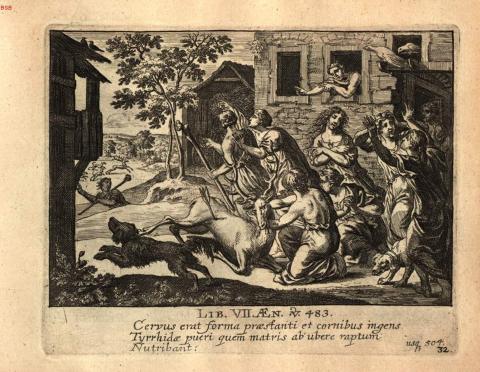CORE VOCABULARY
Turnus, ī, m.: the chief of the Rutulians, 7.56, et al.
Rutulī, ōrum, m.: the Rutulians, an ancient tribe of Latium dwelling south of the Tiber, 1.266, et al.
Allēctō, ūs, f.: Alecto, one of the furies, 7.324, et al.
Teucrī, ōrum, m.: the Trojans, descendants of Teucer, 1.38, et al.; adj., Teucrian, Trojan, 9.779, et al. (Teucer)
Stygius, a, um: adj. (Styx), pertaining to the Styx; of Hades; Stygian, 4.638, et al.
concitō, āvī, ātus, 1, intens. a.: to move with force; hurl, 11.784; spur, 11.742; (with sē), to speed, fly, 7.476.
āla, ae, f.: a wing, 1.301; the feather of an arrow, 9.578; the wing of an army; cavalry, 11.730; troop, battalion, 11.604; horsemen, mounted huntsmen, 4.121.
speculor, ātus sum, 1, dep. a. and n.: to look out, mark, survey, behold, espy, 7.477; watch, consider, observe, 1.516. (specula)
īnsidiae, ārum, f.: a sitting down, or lying in ambuscade; an ambush, 11.783; snare, toil; plot, treachery, wile, 2.36; stealthy journey or enterprise, 9.237; artifice, stratagem, 2.421; personif. pl., Īnsidiae, ārum, Stratagem, 12.336. (īnsideō)
Iūlus, ī, m.: Iulus or Ascanius, son of Aeneas, 1.267, et freq.
subitus, a, um: having come up suddenly; unexpected, sudden, 2.692; suddenly, 3.225. (subeō)
rabiēs, em, ē, f.: madness, frenzy, fury, fierceness, 2.357, et al.; of inanimate things, 5.802, et al.
Cōcȳtius, a, um: (adj.), of Cocytus, 7.479.
obiciō, iēcī, iectus, 3, a.: to throw against or towards; throw to, 6.421; present, oppose, 2.444; bar against, shut, 9.45; cast upon, 7.480; subject, expose, 4.549; (pass.), to be presented, appear, 5.522; p., obiectus, a, um, thrown towards or against; opposite, projecting, 3.534. (ob and iaciō)
nāris, is, f.: a nostril; pl., nārēs, ium, the nostrils; the nose, 6.497.
odor, ōris, m.: scent, smell, odor, fragrance, 1.403; disagreeable odor, stench, 3.228; foul fumes, 12.591.
cervus, ī, m.: a stag, deer, 1.184, et al.
ārdēns, entis: burning, hot, sparkling, flaming, 5.637; bright, 4.482; impassioned, ardent, eager, 1.423; spirited, fiery, 1.472; glowing, lofty, 6.130; fierce, furious, 2.529; angry, 6.467. (ardeo)
accendō, ī, cēnsus, 3, a.: to set fire to, light up, enkindle, 5.4; enrage, exasperate, incense, 1.29; incite, rouse, 4.232. (ad and candō, rel. to candeō)
agrestis, e: adj. (ager), pertaining to the fields or country; country-, rustic, rural, 3.34; wild, 7.111; subst., agrestis, is, m., a rustic, 7.504; husbandman.
praestāns, antis, comp., praestantior, ius: excellent, superior, distinguished, 5.361; w. gen., 12.19.
Tyrrhīdae, ārum, m.: the sons of Tyrrheus, 7.484. (Tyrrheus)
ūber, eris: (adj.), fruitful, fertile, 3.106. (compar., ūberior; superl., ūberrimus), (ūber)
nūtriō, īvī or iī, ītus, 4, a.: to nourish, suckle, 11.572; breed, rear, train, 7.485.
Tyrrheus (dissyll.), eī, m., and Tyrrhus, ī, m.: a shepherd of Latium, in the service of Latinus, 7.532, et al.
armentum, ī, n.: collective (arō), beasts used for plowing; cattle, 2.499, et al.; of all kinds of animals, a herd, drove; of deer, 1.185; of horses, 3.540.
lātē: (adv.), widely; far and wide, 1.21; on all sides, far around, 1.163; all over, 12.308. (lātus)
cūstōdia, ae, f.: a watching, watch; guardianship, care; a watch, guard, 6.574. (cūstōs)
adsuēscō, suēvī, suētus, 3, a. and n.: to accustom to, make familiar, habituate to; with dat., acc. and dat., and infin., to get or become accustomed, be wont, learn; with abl., 7.746; adsuēscere bella animīs, instead of adsuēscere animōs bellīs, to cherish war in the heart, 6.832.
Silvia, ae, f.: daughter of Tyrrheus, 7.487. (silva)
intexō, uī, tus, 3, a.: to weave into or in; work in, inweave, 5.252; festoon, wreathe, entwine; cover, 6.216; frame, 2.16.
ōrnō, āvī, ātus, 1, a.: to adorn, equip, 10.638.
serta, ōrum, n.: things entwined; garlands, festoons, wreaths, 1.417, et al. (sero, serere, serui, sertus)
pectō, pexī, pexus, 3, a.: to comb, 12.86.
ferus, ī, m.: a wild beast; in gen., a brute; a beast, 2.51; courser, steed, 5.818; stag, 7.489.
pūrus, a, um: (adj.), free from stain, pure, 7.489; clear, serene, 2.590; open, unobstructed, 12.771; unmixed, 6.746; pointless, 6.760; unmarked, without symbol, or device, 11.711.
lavō, lāvī, lautus, and lōtus, 1 and 3, a. and n.: to wash, bathe, 3.663; wet, sprinkle, 6.227; p., lautus, a, um, washed; neat, elegant; stately, magnificent, 8.361.
manus, ūs, f.: the hand, 1.487; freq.; (meton.), action, movement of the hand; work, art, handiwork, 3.486; prowess, heroic deed, action, 2.434; force, violence, 2.645; a collection of persons; a band, crew, troop; an army, 2.29; forces, 5.623; multitude, 6.660; pl., manūs, workmen, 11.329; dare manūs, to yield, 11.558; extrēma manus, the finishing hand or touch, 7.572.
erīlis, e: adj. (erus), pertaining to an owner, master, or mistress; master’s, 7.490.
sērus, a, um: (adj.), late, freq.; late in life, 6.764; slow, tardy, 2.373; too late, 5.524; (adv.), sērum, late, 12.864.
quamvīs: (adv. and conj.), as much as you will; however much; however, although, albeit; w. subj., 3.454; freq. w. an adj. (quam and volō)
rabidus, a, um: (adj.), raving, savage, mad, raging, 6.421; frenzied; frantic, raving, 6.80.
vēnor, ātus sum, 1, dep. n. and a.: to hunt, 4.117.
commoveō, mōvī, mōtus, 2, a.: to move completely; move rapidly in procession, 4.301; rouse, start from cover, 7.494; shake, stir, 5.217; disturb, move, 1.126; agitate, terrify 1.360.
fluvius, iī, m.: a stream; river, 1.607; water, fountains, abundant water; secundō fluviō, by the favoring stream, with or down the stream, 7.494. (fluō)
dēfluō, fluxī, fluxus, 3, n.: to flow down; sail down, 8.549; alight, descend, 11.501; fall, descend, 1.404.
aestus, ūs, m.: glowing heat; summer; a boiling; a billowy motion; waves of flame, flames, 2.706; wave, surge, 1.107; tide, sea, flood, 3.419; tide (of feeling), agitation, 4.532.
viridō, 1, n.: to be green, verdant. (viridis)
levō, āvī, ātus, 1, a.: to render light; lighten; lift, aid, 1.145; raise, 4.690; (fig.), ease, relieve of (w. abl.); support, rest, 10.834; reënforce, help, 2.452; mitigate, 3.36; allay, 7.495; cure, 7.755; relieve, 7.571. (2. levis)
eximius, a, um: adj. (eximō), exceptional; choice, select; distinguished, 7.496.
succendō, cendī, cēnsus, 3, a.: to set on fire from beneath; (fig.), inflame, incite, 7.496. (sub and obs. candō; cf. incendō)
Ascanius, iī, m.: Ascanius, son of Aeneas, and traditional founder of Alba Longa, 1.267.
curvus, a, um: (adj.), curved, bent, bending, 2.51; winding, 2.748; crooked.
dērigō, rēxī, rēctus, 3, a.: to lay straight, bring into a definite line; to aim, direct, 1.401, et al. (dē and regō)
spīculum, ī, n.: a sharp point; (meton.), an arrow, a dart, javelin, spear, 5.307.
nec or neque: (adv. and conj.), and not; neither, nor, 1.643, et al.; in prohibition, 3.394, et al.; neque (nec) — neque (nec), neither — nor, 5.21, et al.; nec — et, or -que, may be rendered neither — nor, 12.801; 2.534; nec nōn, and also, nor less, 6.183; nec nōn et, and also, 1.707.
absum, āfuī or abfuī, āfutūrus or abfutūrus, abesse, irreg. n.: to be away; to be absent, 2.620; distant, 11.907; to be wanting, missing, 1.584; inf., āfore, or abfore, will be wanting, 8.147.
uterus, ī, m.: the womb, belly, 11.813; cavity, 2.38.
sonitus, ūs, m.: a sounding; noise, 2.732, et al.; roaring, 2.209; thunder, 6.586. (sonō)
īlia, ium, n. pl.: the groin, flank, 7.499; belly, 10.778.
veniō, vēnī, ventus: to come, freq.; come forth; approach, 6.755; rise, appear, 1.353; dawn, 10.241; to present one's self or itself, 5.344; descend, spring from, 5.373; impers., ventum est, we, they came or have come, 4.151.
arundō, inis, f.: a reed, arrow, 4.73.
saucius, a, um: (adj.), wounded, 2.223; pierced, 4.1.
at and ast: (conj., denoting addition either with the notion of difference, or of decided opposition), but, 1.46; yet, still, after conditional propositions; in adding new particulars, and in transitions, but also, but, now, 4.1; denoting indignation, with execration, 2.535.
quadrupēs, edis: adj. (quattuor and pēs), four-footed; subst., c., a quadruped, animal, beast, 3.542; courser, steed, 11.875.
intrā: (prep. w. acc., and adv.), on the inside; within, 2.33, et al.; for in, 7.168.
refugiō, fūgī, 3, n. and a.: to fly, 3.258; flee away, 6.472; recede, stand distant, 3.536; shrink, 2.12; w. acc., start back from, 2.380; shrink from, refuse, 7.618; fugere, refugere, to fly to and fro, 12.753.
succēdō, cessī, cessus, 3, n. and a.: to go, come up to or under, with dat., or acc. and prep., or without a case, to go up to, visit, 8.507; ascend, 12.235; come up to, advance to, 2.478; approach, 7.214; encounter, 10.847; enter, 1.627; creep under, disappear beneath, 5.93; to descend into the earth, to be buried, 11.103; take up, take upon one's self, 2.723; go under, be yoked to, 3.541; to follow, 11.481; to turn out well; succeed, come to pass, 11.794. (sub and cēdō)
gemō, uī, itus, 3, n. and a.: to groan, 7.501; sigh, 1.465; bemoan, bewail, lament, 1.221; of inanimate things, creak, 6.413.
stabulum, ī, n.: stable, stall, 2.499; a shepherd's dwelling, grange, 7.512; den, haunt, 6.179; cattle-camp, 8.207. (stō)
questus, ūs, m.: a complaining; moaning; groans, 7.501; mournful sound. (queror)
cruentus, a, um: (adj.), bloody, blood-stained, 1.296; covered with blood, 10.498.
implōrō, āvī, ātus, 1, a.: to entreat, implore, supplicate, 4.617.
repleō, plēvī, plētus, 2, a.: to fill again; fill up, fill, 2.679, et al.
palma, ae, f.: the palm of the hand, 8.69; the hand, 1.93; palm branch, 5.111; a palm branch or wreath as the symbol of victory; reward, prize, 5.349; victory; a victor, 5.339.
percutiō, cussī, cussus, 3, a.: to smite through; strike, smite, 4.589; p., percussus, a, um, struck, smitten, 7.503; of the effect of sound, reverberating, echoing, penetrated, filled, 1.513; 8.121. (per and quatiō)
lacertus, ī, m.: the upper arm, from the shoulder to the elbow; the arm, 5.141, et al.
conclāmō, āvī, ātus, 1, n. and a.: to call out aloud; shout, cry, 3.523; call together, 7.504.
pestis, is, f.: destruction, 5.699; plague, pest, scourge, 3.215; death, 9.328; infection, pollution, 6.737; fatal, baneful passion, 1.712. (perdō)
asper, era, erum: (adj.), rough, 2.379; rugged, craggy, jagged, 6.360; chased, embossed, 5.267; (fig.), of the weather, stormy, 2.110; of temperament, spirit, or nature, barbarous, 5.730; formidable, fierce, 1.14; full of strife, warlike, 1.291; cruel, stern, 6.882; angry, 1.279; bitter, 2.96; displeased, 8.365.
imprōvīsus, a, um: (adj.), unforeseen; unlooked for, unexpected, 1.595.
adsum, adfuī, esse, irreg. n.: to be near or by; to be present, at hand, or here, 1.595; to have arrived, 2.132; to be with, attend, 2.701; aid, accompany, 10.547; be propitious, 3.116; to beset, 2.330; inf., adfore, to be about to come, destined to come, 7.270. (imp. subj., adforem, -ēs, -et, -ent)
torris, is, m.: a firebrand; brand, 7.506. (torreō)
armātus, a, um: armed, charged, 12.857. (armō)
obūstus, a, um: adj. (ob and ūrō), burnt, hardened in the fire, 7.506.
stīpes, itis, m.: a log or post, stem, trunk of a tree, 3.43; club, 7.524.
gravidus, a, um: adj. (gravis), heavy, 7.507, et al.; with young, pregnant; (fig.), pregnant, teeming with, 4.229.
nōdus, ī, m.: a knot, 1.320, et al.; of a tree, 11.553; bond, 1.296; coil, 2.220; (fig.), difficult point; center of strife, 10.428.
quis, qua or quae, quid or quod: (indef. pron., adj., and subst.), any, some, 2.94, et al.; some one, any one, any body, anything, something, 1.413, et al.; sī quis, nē quis, etc., if any, lest any, etc., freq.; (adv.), quid, as to anything, in anything, at all, freq.; sī quid, if at all, freq.
rīmor, ātus sum, 1, dep. a.: to force open in cracks or chinks; (fig.), to ransack, explore, search, 6.599. (rīma)
quadrifidus, a, um: adj. (quattuor and findō), four-cleft, split into four parts, 7.509.
quercus, ūs, f.: an oak tree, 3.680; (meton.), an oak leaf crown, 6.772.
cuneus, ī, m.: a wedge, 6.181; a wedge-shaped battalion; battalion, 12.269; dare cuneōs, to form battalions, 12.575; pl., cuneī, ōrum, the seats of the theater; an assembly, 5.664.
scindō, scidī, scissus, 3, a.: to cut asunder; split, 6.182; part, separate, divide, 1.161; tear, 9.478; (fig.), divide, 2.39.
spīrō, āvī, ātus, 1, n. and a.: to breathe, blow, 5.844; palpitate, 4.64; pant; breathe heavily, 7.510; heave, boil, 10.291; of odors, breathe forth, exhale, emit; w. acc., 1.404; p., spīrāns, antis, lifelike, breathing, 6.847.
immāne: (adv.), wildly, fiercely, 12.535.
secūris, is, f.: an ax, 2.224, et al. (secō)



